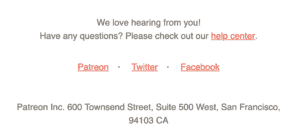Is Your Email Marketing Campaign CAN-SPAM Compliant?

What is CAN-SPAM Compliance?
In 2003, the Federal Trade Commission began enforcing a set of requirements for all commercial email messages, in order to protect the consumers. This bill, called the CAN-SPAM Act (The Controlling the Assault of Non-Solicited Pornography and Marketing Act of 2003), spells out tough penalties for business that violate these standards.
Here are seven regulatory facts to know about email marketing:
1. All Commercial Emails are Subject to Regulation
These regulations apply to all commercial emails, not just bulk emails. For the context, commercial is defined as “any electronic mail message the primary purpose of which is the commercial advertisement or promotion of a commercial product or service.” That means every coupon, newsletter, and sale advertisement has to be compliant. There is no exception for business-to-business marketing, but it does exclude transactional/relationship emails.
2. Your Subject and Header Have to State the Offer
Your subject line must be very precise. You cannot send a commercial email that doesn’t clearly state what the email is regarding. You can’t send an email that says, “Free Gift Card with Purchase” if that’s not what you’re actually offering. Below are some examples of good headers that clearly state the offer:
Additionally, you have to clearly state the “From,” “To,” and “Reply-To” addresses within your header.

The subject lines state what the reader is going to learn about once they open the email without being elusive or underhanded.
3. It Has to Look Like an Ad
If the email that you are sending out is attempting to sell a product or service, that must be made abundantly clear from the moment that the email is opened. Additionally, the ad must state the offer very clearly. Not forcing the consumer to read the fine print in order to understand exactly what the deal is.

This recent Groupon email is obviously an advertisement for $5 for $10 gift cards. It’s clear what the offer is and how much I would have paid to participate.
4. An Address is Necessary
This one’s pretty easy– Your advertising emails have to contain your physical address, whether it’s your business’ street address or the P.O. box you use for company mail. This rule is in place to help you maintain transparency and reassure your recipients that the email is coming from the source that is claiming to send it. Most commercial emails list this at the bottom, in the footer. Make it a part of your marketing email template, so you won’t accidentally forget to include it.

5. Opt-Out Options on Every Email
We all hate losing subscribers, but you face heavy fines if you make the opt-out button hard to find. Opt-outs must be able to be completed within a few clicks and easy enough that your average consumer could do it quickly.
One helpful caveat, though, is that you are allowed to give them a list of items to unsubscribe from. For example, if you send out a newsletter and marketing emails, they can check each item separately, in order to keep receiving thecommunications they want.

Every marketing email you send must have this option somewhere within the message, like MAC does in the example below:
6. Once Opted-Out, Honor the Request
Within 10 days of your customer’s request, they must be completely opted-out of any marketing emails from your company. Other stipulations to this, according to CAN-SPAM compliance rules, include not charging a fee for the opt-out, not requesting personal information other than the email address, and never selling the email address to another company.
7. Your Marketing Company is Representing You
Even if you outsource all of your marketing email composition to a third-party marketing agency, you are responsible for everything that they do. While they will also be held responsible for breaking these codes, you’re on the line for their mistakes. Make sure that your marketing agency understands that your business takes CAN-SPAM compliant emails very seriously and take the time to proof marketing emails before they are sent out.
Disclaimer: We are not lawyers, and as such, this blog should not be misconstrued as legal advice. It is for entertainment purposes only.